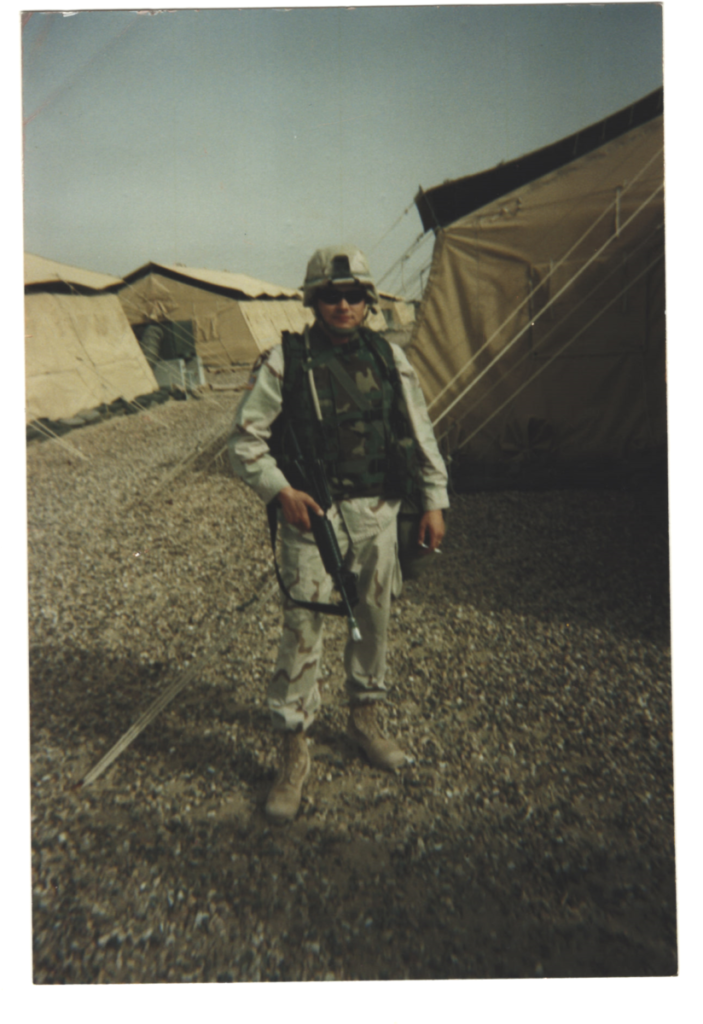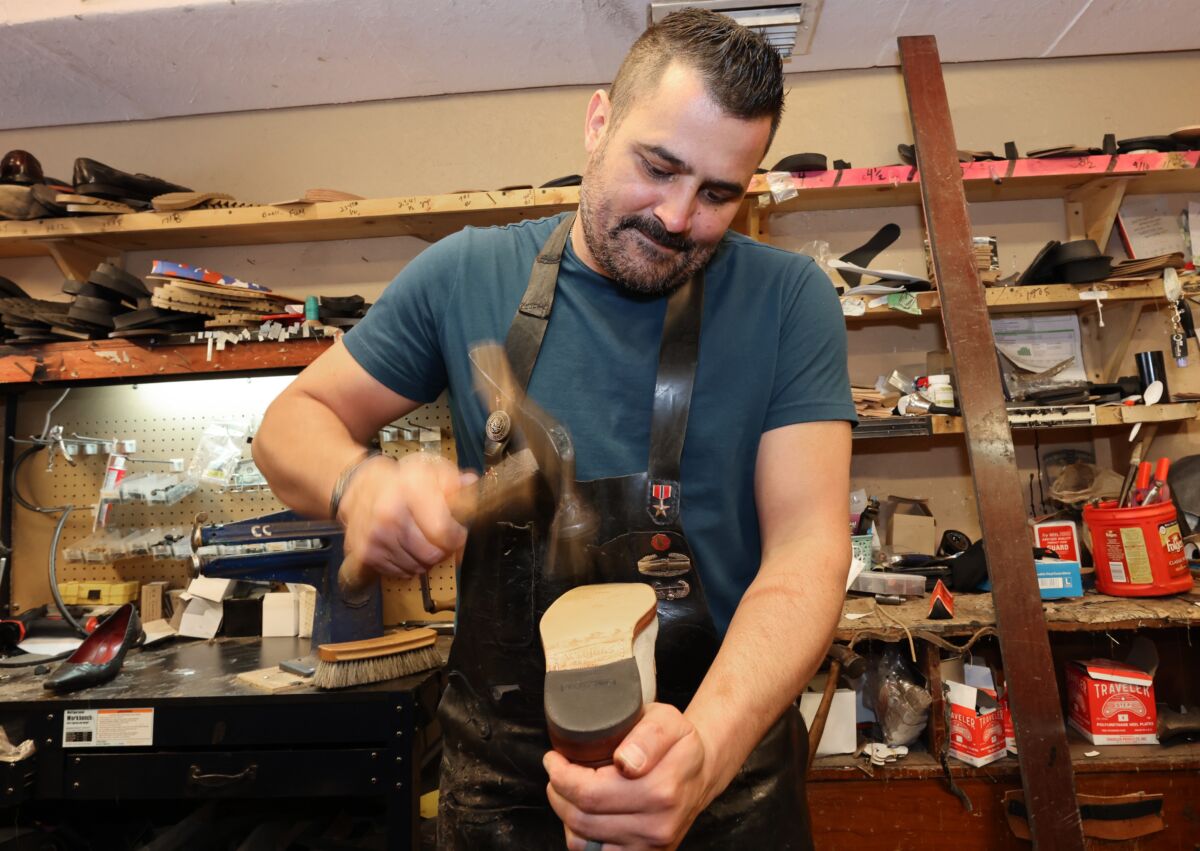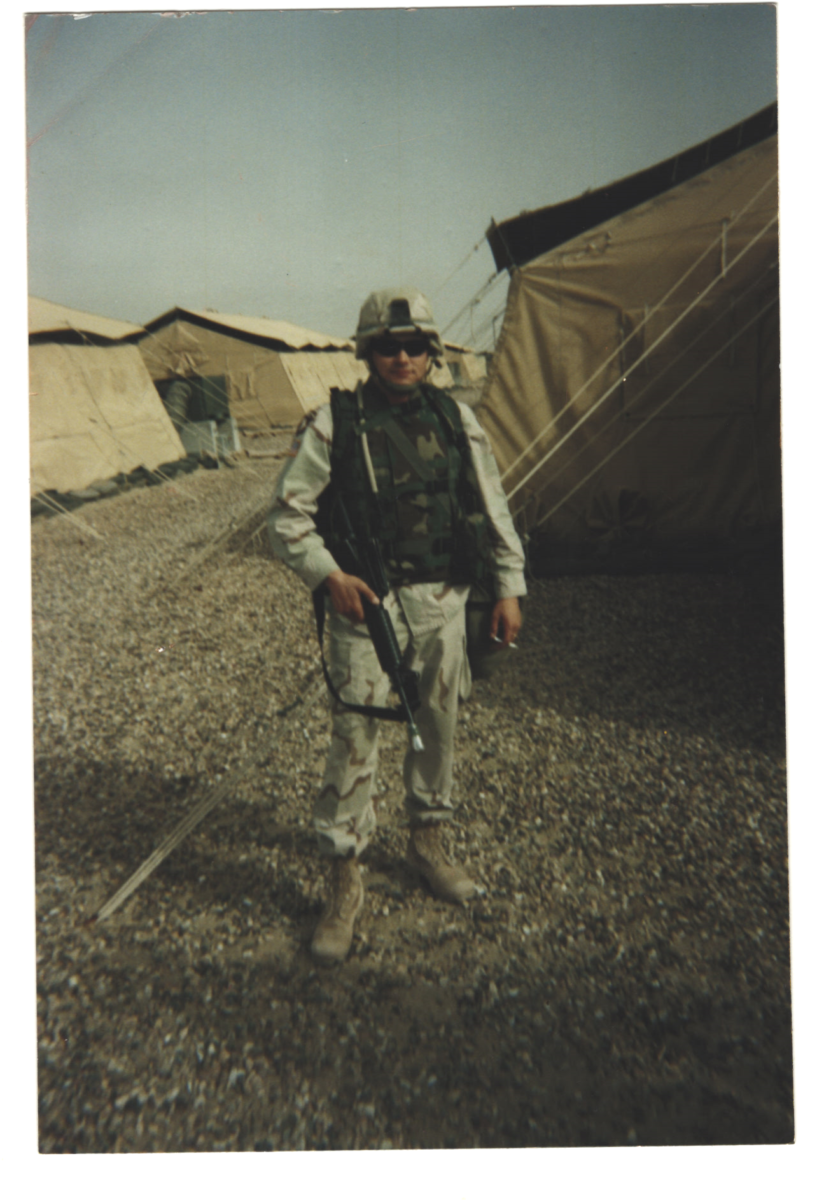Veterans’ assistance available in Marion County


Alan Hill hammers on the sole of a shoe as he works at The Crafty Cobbler Shoe Repair on East Silver Springs Boulevard in Ocala, Fla. on Tuesday, Nov. 9, 2021. Hill is a veteran and a local business owner. [Bruce Ackerman/Ocala Gazette]
For those veterans who choose to settle in Marion County, or those already calling the county home, a host of organizational support exists to help connect them with groups that can provide a wide range of services.
Jeff Askew, the Veterans Services Director for Marion County, says his department acts as a one-stop-shop for veterans who are looking for help.
“Once they get here, we find out exactly what their needs are. Do they need healthcare? If so, we’ll get them into the healthcare system. Do we need some type of education benefits for them or their children? We help them get that. Do they need housing? We’ll assist them in getting housing. Do they need food? Clothing? They need to know those types of things are things we can assess immediately,” he said.
Another organization designed to assist veterans is the Marion County Veterans’ Council. Askew states they meet once a month and consist of about 45 different veterans’ service organizations (VSO) in the area such as the American Legion, Disabled American Veterans, Veterans of Foreign Wars, Military Officers of America, Vietnam Veterans, Daughters of the American Revolution, and more.
“We meet to find out what everybody’s need is, regardless of whether you’re on the west side, east side, south side, wherever,” he said.
Alan Hill is one of the many veterans who call Ocala home. Hill, along with his wife, Lauren, owns and operates the Crafty Cobbler in Ocala. He was a weapons mechanic in the U.S. Army, and throughout his time on active duty, he deployed to Iraq, Afghanistan, and Pakistan and earned a Bronze Star, among other awards, as a result of his actions during his time deployed.
During his second deployment, Hill’s vehicle was in the vicinity of an improvised explosive device (IED) that detonated, and the resulting blast left him with a traumatic brain injury (TBI) and residual post-traumatic stress disorder (PTSD) that was so severe, ultimately, it saw him permanently medically retired from the Army.
As a result of his injuries suffered on active duty, Hill was forced to deal with multiple systems in order to access the healthcare and benefits he was entitled to.
“The VA [Veterans Administration] is not for lazy people. You have to do your own legwork,” Hill commented.
Askew says he understands the exasperation that comes with dealing with systems such as the VA.
“That’s what makes veterans frustrated,” Askew pointed out. “Because they don’t know how to navigate the system or the red tape. There’s a right way to do it and a wrong way. So, you just have to go down the right path, and then, you can get it done a lot quicker.”

Alan Hill is pictured here while serving overseas. [Submitted]
According to their website, Veterans Helping Veterans is an organization that is a “501(c)(3) not-for-profit organization serving veterans and their families. The organization was established in 1997 and later incorporated in 2002 to serve veterans and their families in need of assistance.”
Askew said having all the services in a one-stop-shop setting helps assist veterans when they must navigate oftentimes complex state or federal systems in order to file for benefits, or even with everyday issues.
“If they first come here and need clothes, we can take them over to get clothes. If they need to talk to a chaplain because they or someone in their family had something happen and they need that type of service, they have a chaplain over there. If they need to talk to someone about Medicaid, Medicare, there’s somebody over there for that. They have Operation Angel Wing, a charity that helps those who suffer from PTSD. There’s someone over there that can help with home loans. They can even get food over there too.”
While they previously served a large population of World War II veterans, Askew says overall the veterans they serve come from all branches and conflicts.
“We see a lot of Vietnam veterans, a lot of Korean War veterans…but we also see a lot of newly discharged Afghanistan, Iraq veterans, those who didn’t want a career, they just went in to get enough time to get the education benefits, maybe they were in seven to ten years. So, they get out and they come back home to go to school. They want to be reintegrated back into that community.
Once they get back in the community, Askew said veterans who have an advocate or support system often fare better than those who don’t.
Hill can attest to that.
“She’s my advocate,” Hill said about his wife.
“When I got out of the military, I was [using anxiety medicine] so bad that I actually got addicted to medication from the VA, and I ended up in the hospital,” Hill recalls.
Rather than continue to prescribe him the medicine he was abusing, Hill said his doctor told him, “Look, I’m gonna ship these to your wife and she is going to distribute them to you because I trust that she’s not gonna allow you to just gobble them up.”
By being open about his struggles, Hill hopes he can assist other veterans grappling with their own issues.
“But when you get to that point like I am now, where you are openly talking about your disabilities or disadvantages, whatever you call them, I mean, no one really sees your wounds. I feel better about talking about it because it kind of lifts the stigma off for other veterans.”
Hill noted he encounters quite a few veterans at his shoe repair shop. Of all the ones he encounters, he notices he connects with Vietnam veterans the most and tries to be a friendly ear during their conversations.
“They came back and a lot of them still haven’t had any medical or mental health help. And they need it. They’re still talking to me about nightmares or waking up in a cold sweat thinking about still being in Vietnam. You’re talking all these years that went by, and they’re still too stubborn to get help. Why? Because like it or not, there’s still a stigma,” Hill said.
“I feel like a lot of times, I’m the one that really opens that door,” he continued. “And then the floodgates open, right, you know, and I’m like, ‘Wow, I wasn’t ready for what I just heard!’”.
Askew understands the struggle some veterans face, and says their community can step up and get help for those who need it.
“That’s where that friend comes into play, a grandparent, an aunt, or uncle. If you see something wrong with them, and you can tell what’s wrong with your relative, you should be able to ask for assistance for that person. We need more of that.”
He also pointed out that while veterans may have had life experiences few others have, they’re still just like everyone else.
“The public just has to realize veterans, we were just regular citizens, and then we took an oath to go out and to defend this nation. But before that, we were just your neighbor, your classmate, your friend. So, when we go away to the military and then come back, we come back still your friend, your neighbor, you know?” explained Askew.
More information on Marion County Veterans Services, including a list of upcoming events at the Ocala-Marion County Veterans Memorial Park, can be found here.
More information on the Marion County Veterans Council can be found here.
To connect with a Veterans Crisis Line responder anytime day or night, call 800-273-8255, then select 1 or text 838255.
Editor’s note: Matthew Cretul is an active-duty veteran of the U.S. Army and spent 15 months deployed to Ramadi, Iraq, in 2006-2007 as a Psychological Operations Specialist.





